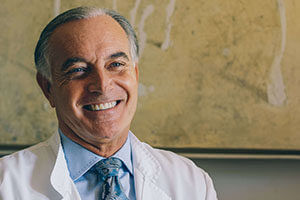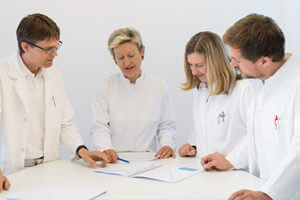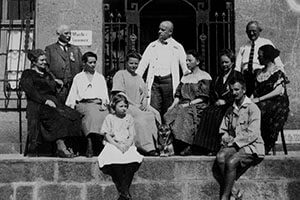JESUIT PRIEST AND ZEN MASTER NIKLAUS BRANTSCHEN AT BUCHINGER WILHELMI
Fasting and meditation: About the transformative power of silence
Niklaus Brantschen is holding a week-long event on “Meditating at Lent” at Buchinger Wilhelmi in Überlingen. The focus is on the spiritual dimension of fasting, on finding peace of mind and reconnecting with ourselves in silence – an aspect that has grown in importance at our clinics over the last 30 years. Brantschen encourages us to be respectful of, but not to fear unfamiliar sensations that can occur during fasting as well as during meditation. Consciously shifting our focus from outer to inner nourishment helps us to find and cultivate silence within us, he says.
“Meditating at Lent” – Finding contemplation and reorientation
Pausing for a moment, reconnecting with ourselves and contemplating – these are things that many people long for in our hectic, noisy, overstimulating and crisis-ridden times. Practising Zen meditation can be a great help in our search for relaxation, tranquillity, inner peace, new sources of strength and the meaning and source of life.
But what is Zen? A mysterious, Far Eastern tradition with strange rituals that are difficult to learn? No, says Niklaus Brantschen, Jesuit and Catholic priest, Zen master, fasting instructor and a friend of the family: Zen is not exotic, it is neither a mere technique nor an abstract system of teachings, but rather a path of quiet concentration and contemplation that leads inwards, from doing and wanting, to being, and finally turning outwards again, into a deeper relationship with our environment and our reason for being. For Zen master Brantschen, who has practised and taught Japanese Zen Buddhism for many years and is able to bring together the essence of Zen and the Christian spirituality of the West in a meaningful dialogue, the connection to fasting is obvious: Both support and reinforce each other and lead to greater mindfulness, self-awareness and sensitivity for one’s own needs and those of others.
The three dimensions of fasting from the perspective of Zen
Fasting is as three-dimensional as life itself, says Brantschen in an interview with Françoise Wilhelmi de Toledo. He talks about it as a relationship on three levels:
- the relationship we have with ourselves and taking care of ourselves
- the relationship with the world around us that we are part of
- the relationship with a greater reality
Sitting in silence can help us find inner peace and tranquilly and put down roots in a place where there is no coming or going, no before or after. Even Otto Buchinger said fasting is basically a question of silence, he says, quoting the clinic’s founder. Life itself is quiet and powerful, and the power of silence is not just a feeling, but a virtue that creates quality of life, according to Brantschen.
Despite his age, Niklaus Brantschen still fasts regularly following the example of Otto Buchinger. He has supervised week-long courses of fasting since 1977, initially at the educational centre in Bad Schönbrunn, where he was director, and later at our clinics in Überlingen and Marbella. After his first book was published on the three dimensions of fasting – health, human and spiritual – he was approached by Buchinger Wilhelmi. Ever since, he has fasted frequently at the clinics in Überlingen and Marbella as a special guest and gives regular meditation classes for patients and guests.
Video: Niklaus Brantschen in conversation
Talking with Françoise Wilhelmi de Toledo, Brantschen emphasises how important the human dimension of fasting is. Fasting is not an end in itself, he says, but also has to do with sharing.
The willingness to share is something that comes from within, from having an open, sensitive mindset, and not as an obligation imposed on us from the outside. There is a social and political aspect to it, he adds, but it is also meant quite literally and practically. The fact that Buchinger Wilhelmi in Marbella continued to buy the usual quantities of fruit and vegetables from local organic farms during the Covid-19 pandemic, even though the clinic was not running at capacity, and gave them to Caritas instead, is a good example of this mindset.
Practising zazen: Sitting in silence
Meditation is one of the most important elements of Zen. It keeps you in the moment and allows your mind to come to rest so that you can experience silence and emptiness. All you need is a chair or a cushion to sit on and a quiet place where you feel at ease. Wear comfortable clothes that do not pinch so that you can concentrate fully on your breathing.
- Sit up on your heels, cross-legged on your cushion, or with your legs slightly apart on the chair. Your back should be straight, your head and spine form a line.
- Fold your hands one inside the other on your lap so that they form a bowl, with the tips of your thumbs touching slightly. The upper body is relaxed, the shoulders may drop down. Half-close your eyes and soften your gaze so that it rests on the floor around two to three metres away from you without focusing.
- Now concentrate on your breath. If you want, you can count each breath or focus your attention fully on the air flowing in and out. If you notice that your thoughts are drifting or you are daydreaming, take notice of it and then let it go and return to your breath. Allow yourself to inhale and exhale naturally. This will ground you during meditation.
- To end the meditation, open your eyes, take a few deep breaths and stretch your arms and legs.
Regular meditation has numerous positive effects. For example, it has been proven to reduce our susceptibility to stress and alleviate the symptoms of stress-related illnesses. It improves our ability to concentrate and also makes us feel calmer, more relaxed and empathetic in our everyday life.
Reading tip
Niklaus Brantschen
Fasten neu erleben: Warum, wie, wozu?
Crossroad Publishing Company, 2010.
Experience fasting holistically: Purify body, mind and soul. Fasting opens up new dimensions of life, including spiritual ones. The experienced fasting guide shows you what to look out for so that fasting really becomes a new, intense experience.

About Niklaus Brantschen
Niklaus Brantschen (born in 1937) is a Jesuit, Zen master, co-founder of the Lassalle-Institut in Bad Schönbrunn, a fasting instructor and author of numerous books, including on the topic of fasting. He entered the Jesuit Order at 22 years of age. He studied theology in Fourvière (France) and Tübingen as well as adult education in Munich (both Germany). He became interested in meditation and interreligious dialogue early on. He took part in meditation courses with Karlfried Graf Dürckheim and spent time from 1976 onwards studying Zen with Hugo Makibi Enomiya-Lassalle and Yamada Kôun Roshi in Kamakura (Japan). He was granted a teaching license by Yamada Kôun Roshi in 1988, and confirmed a Zen master by Glassman Roshi in 1999. Brantschen recognises the practice of Zen Buddhism as an enlightening, never-ending spiritual path between the East and West that can help break down barriers between religions, nations and races – with the aim of becoming one humanity.

The next event “Meditating during Lent” is expected to take place between 02 – 07.03 in 2025.
Would you like more information or a non-binding enquiry? We look forward to hearing from you!









